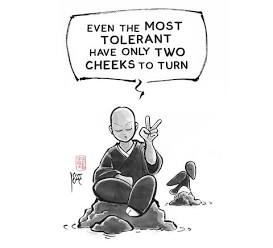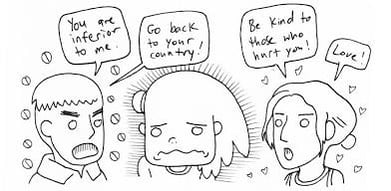Silence, Decorum and Self Respect
When you stand in silence while being demeaned, slandered and demonized, you are doing half the work for your attacker.
POLITICAL
Ron Day
3/6/20254 min read


Our Founding Fathers
I used to live in Weehawken, NJ. If you walk along Kennedy Blvd., you will eventually come to a plaque commemorating the duel between Burr and Hamilton that resulted in Hamilton's death on July 11, 1804
In case you don't know the history, Hamilton had said (publically) that Aaron Burr was a "dangerous man" who shouldn't be trusted with power. Burr was so offended by the statement that Alexander Hamilton refused to retract that Burr challenged Hamilton to the duel that resulted in Hamilton's death.
While the idea of dueling to the death over a public slight might seem a bit extreme today, the reason for the extreme reaction is no less compelling today than it was then. Words matter; their effects have consequences, and our honor, left undefended, can be taken from us.
Public Beratement and Its Implications
Our president loves to openly attack and belittle individuals in a public setting, with the intent of drawing as much attention as possible. He does this on every platform he can access and is motivated by a desire to assert dominance or control.
The implications of public beratement are severe, influencing both the immediate emotional state of the targeted individual and the broader dynamics of power within our society. The effects of public humiliation—shame, embarrassment, and insecurity—are clearly the intent, as are anxiety and depression, motivating people to withdraw from social interactions. This can and does have long-term effects on our psyche as a nation.
It's important to remember the power dynamics at play when the president berates Democrats, individuals or broad swaths of the public at large. The president has controlled the Republican party and now controls the executive branch of our government, allowing him to exert enormous influence over us all. His position affects the perceptions of nonpartisans, who unconsciously align with the perceived "favored" majority. This creates a ripple effect, tainting America's perception of those slandered.
The cumulative effects of public beratement have significantly altered the Democratic Party's standing. The long-lasting impact underlines the necessity for intervention whenever the president is allowed to publicly malign the Democratic Party, and no one stands to protect our rights and dignity.
Take Back the Narrative.
Reclaiming the narrative in the face of the president's behavior requires deliberate effort. We know most of what he will say, so it is essential to offer proactive communication before his public events to counteract the negative impact of degrading remarks. We must clearly and confidently establish boundaries. False statements, slanders, and defamations must be corrected in real-time to reshape perceptions, defend our position, set the record straight and dissuade others from accepting defamations and slanders.
On the softer side, we can use personal storytelling to reclaim the narrative. By sharing experiences, individuals can humanize their perspectives and foster empathy. This should be done before and after the president can demean and disparage.
Decorum?
Al Green was recently removed from the house chamber for lack of decorum in the face of the president's lies and divisive language during his address to the joint houses of Congress.
Decorum shapes how we respond to conflicts and perceived injustices. Predictable expectations regarding behavior, tone, and presentation are important, particularly in contentious situations. These norms have created a dilemma for those facing demeaning and disrespectful words while still wanting to maintain order.
While we expect our representatives to respond to adversity with calm and composure, we do not expect them to be silent. Those who choose to stand against the president's words will undoubtedly be depicted unfavorably on partisan networks, but composed actions by the entire democratic caucus will protect individual members. Self-advocacy framed negatively by partisans should never deter us from necessary action to defend ourselves from false accusations and slander. When faced with ignoble attacks or personal and divisive slanders made by the president, congressmen have a duty to protect the honor and good name of their constituents.
We can no longer be confused and must respond appropriately. There is no nuance in the president's communication style. His speaking style is itself a breach of decorum that should not be allowed to legitimize abuse at the expense of the abused standing against mistreatment. There are limits to the rules imposed by decorum, and our society has long demanded that our leaders empower individuals to assert their rights without the fear of censure.
We have a role
Bystanders and allies who witness these public encounters, especially in situations involving divisive and inflammatory language, control the immediate outcome. When individuals witness disrespectful behavior, their reactions (or lack thereof) either normalize or disrupt it, promoting a culture of accountability or acceptance. That is a choice we and our representatives are making every day.
Supportive interventions by fellow congressmen and the public at large can take various forms, ranging from verbal challenges, or turning our backs and walking away. Vocal allies who actively speak out against demeaning behavior serve to empower victims, validating their experiences and reiterating that they are not alone. This vocal support can restore dignity to individuals feeling marginalized or belittled in public spaces. Furthermore, a strong presence of allies will eventually dissuade the president and his allies from escalating their behavior, as the added scrutiny will serve as a deterrent.
On the other hand, silence from our Congressmen and the public (us) signals our acceptance of the status quo, implicitly allowing harmful language and actions to continue without repercussion.
I understand why people choose not to intervene due to fear of retribution, social discomfort, or uncertainty about how to respond. If our elected officials do not have the tools and education to know how to act with the confidence and security necessary to do what is necessary effectively in such situations, then we need to educate or replace them. Our Congress and we, the public, need to cultivate a community where we are no longer bystanders when we see others attacked, demeaned, or disparaged.
Ultimately, the collective willingness of individuals to stand against the president's behavior can contribute significantly to reinforcing rights and dignity for all and ultimately challenge the structures that allow his misconduct to thrive.


